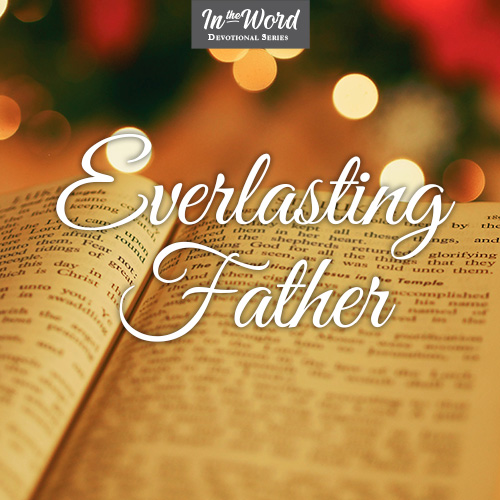In the Word: Everlasting Father

Welcome to Hope Mommies’ In the Word devotionals. Over the next several weeks, we will be looking at different names of God found in Scripture, and how these different aspects of who He is offer us hope in the midst of our grief. As we study together, we encourage you to use the comments as a place to dialogue with us about what you are learning and share your answers to the questions below. We pray that you hearts will be encouraged as you study these names of God along with us!
 “For to us a child is born, to us a son is given; and the government shall be upon His shoulder, and His name shall be called Wonderful Counselor, Mighty God, Everlasting Father, Prince of Peace.” Isaiah 9:6
“For to us a child is born, to us a son is given; and the government shall be upon His shoulder, and His name shall be called Wonderful Counselor, Mighty God, Everlasting Father, Prince of Peace.” Isaiah 9:6
READ:
The prophet Isaiah calls Jesus “Everlasting Father” (Isa. 9:6). By this, does Isaiah mean that Jesus created the world and sustains it by the word of His power (Heb. 1:3; Col. 1:16-18)? That He is the author and finisher particularly of our faith (Heb. 12:2)? Is there a Trinitarian reference in view here—that those who would see the Son, would indeed see the Father since Jesus and the Father are One (John 14:9)?
The title seems to draw us to wonderfully ponder truths like these, and potential implications. But today, I want to simply draw our attention to a seemingly related passage in Isaiah that further describes the care and eternality of God: “For thus says the One who is high and lifted up, who inhabits eternity, whose name is Holy: I dwell in the high and holy place, and also with him who is of a contrite and lowly spirit, to revive the spirit of the lowly, and to revive the heart of the contrite” (Isaiah 57:15).
Jesus’ eternality can mold the laments of our grief. One application I see of Isaiah 9:6 and Isaiah 57:15 is that Jesus fathers us. He caringly oversees us during present dangers and with future implications in mind. He is “taller” than us, seeing, as an earthly father, what is ahead—but eternally.
While being on high, He is also with those who are contrite and lowly. Lowliness reminds us that we cannot fix ourselves; rightly considered, we are weak. Contrition comes from a spirit that dearly wishes we could offer better to God than our hearts sometimes can in grief—along with a spirit trusting that His goodness to us in Christ does not change.
Thinking of Jesus as Everlasting Father is first utterly majestic. And then, thinking that the Everlasting Father dwells with the contrite and lowly is utterly merciful and relieving. We can breathe to God in prayer the honest fullness of what is accurately within us in grief, even if what dwells within is unbecoming and in error. As we have humble, confessing, broken spirits, He promises in all mercy and grace to dwell with us in Christ—who died for us, taking our place to endure the judgment of God for our sins, and rising again as the Lord of life.
We offer our cries of sorrow to this Lord whose tall, pure, and immanent love can be trusted, as with the care of a perfect Father set on reviving His worn children.
REFLECT
- Have your cries to God been shaped by remembering Him as the One who dwells with—fathers—the lowly and contrite?
- Have your cries to God been shaped by remembering God as the high and holy One who inhabits all eternity?
- Read Isaiah 57:15 again. How does knowing Jesus as Everlasting Father give you hope about your grief journey?
- Lianna
Hope Mom to Noelle
Lianna (@liannadavis) is wed to Tyler and mom of two dear daughters. She is author of Made for a Different Land: Eternal Hope for Baby Loss(Hope Mommies, 2019). More of her writing can be found at her website.
We would be honored to share your story as a Hope Mom on our blog. On Saturdays we feature Hope Moms’ stories in order to showcase God’s faithfulness even in the midst of such deep sorrow. If you would like to have your story shared on our blog for this purpose, learn more and submit here.


Got something to say?